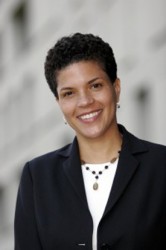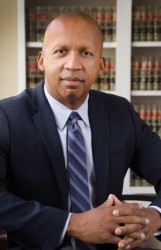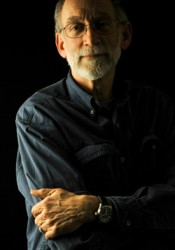‘Re-Visioning Justice in America’ features Alexander, Stevenson, Zehr
For the first time, three national experts on critical issues surrounding mass incarceration and restorative justice—Michelle Alexander, Bryan Stevenson and Howard Zehr—will be featured at a public conference on prison reform April 17-19 at Vanderbilt University Divinity School.
The Cal Turner Program for Moral Leadership in the Professions is working with the Rev. Joe Ingle, a longtime prison reform advocate, and many others to organize “Re-Visioning Justice in America.”
“We will bring together many of the best minds from across the nation as well as in our Vanderbilt and Nashville communities to consider solutions to our broken prison system,” said Graham Reside, executive director of the Cal Turner Program.

Alexander is a civil rights attorney who earned her bachelor’s degree from Vanderbilt’s College of Arts and Science in 1989. She was a Gertrude Vanderbilt Minority Scholarship recipient who majored in political science. She also graduated from Stanford Law School and clerked for U.S. Supreme Court Justice Harry A. Blackmun. Prior to entering academia, Alexander was director of the Racial Justice Project for the ACLU of Northern California. She holds a joint appointment at the Kirwan Institute for the Study of Race and Ethnicity and the Moritz College of Law at The Ohio State University. Her first book, The New Jim Crow: Mass Incarceration in the Age of Colorblindness appeared on The New York Times bestseller list for more than a year. She delivered the keynote address in 2013 at Vanderbilt’s annual event commemorating the life and legacy of Martin Luther King Jr.

Stevenson, a public-interest attorney, is founder and executive director of Equal Justice Initiative, a human rights nonprofit based in Montgomery, Alabama, to advance justice. He has earned national acclaim for his legal work challenging biases against the poor and people of color in the justice system. Equal Justice Initiative won a historic ruling in the U.S. Supreme Court holding that mandatory life-without-parole sentences for all children 17 or younger are unconstitutional. Stevenson, a graduate of Harvard Law School and Harvard School of Government, is on the faculty of New York University’s School of Law.

Zehr, a pioneer in restorative justice, is a prolific writer, editor, speaker, educator and photojournalist. He has led hundreds of events in more than 25 countries and 35 states, including trainings and consultations on restorative justice, victim-offender conferencing, judicial reform and other criminal justice matters. He earned his doctorate at Rutgers University after receiving his master’s from the University of Chicago. From 2008 to 2011, he served on the Victims Advisory Group of the U.S. Sentencing Commission. In 2013, Zehr stepped away from active classroom teaching to become co-director of the Zehr Institute for Restorative Justice at Eastern Mennonite University. He is the author of Changing Lenses: A New Focus for Crime and Justice.
Plans for the conference grew out of a working group of local academics and activists at the Cal Turner Program that has been exploring problems related to mass incarceration, the death penalty and discrimination in the justice system.
Reside credits Ingle, a United Church of Christ minister who recently taught a Vanderbilt Osher Lifelong Learning course, with helping drive the Cal Turner Program toward addressing this issue now. “I learned that Nashville has become a ‘hotbed’ of activists working on the issue of mass incarceration,” Reside said. “In addition, if you are black or brown, you are much more likely to suffer the consequences of the penal system, which is dehumanizing and debilitating.”
Ingle believes that this is a fortuitous time for a conference on prison reform in Nashville. “When I was working on this issue back in the 1970s and ’80s, so many people supported harsh punishment, including the death penalty,” Ingle said. “It was difficult to even have a discussion. [lquote]Now people are at least willing to ask questions like ‘Why do we have more than two million people locked up?'”[/lquote]
Ingle thinks the greater awareness of the broken prison system comes from several directions. “Michelle Alexander’s bestseller, The New Jim Crow, certainly brought tremendous focus to prison issues,” Ingle said. “Also, the crime rate has been on a downward trend across the country for 25 to 30 years, yet the number of people being locked up continues to rise. Outdated public policies are partly to blame for this phenomenon. It is certainly extraordinary to have our three keynote speakers in one place to share their insights on best practices.”
Representatives from Project Return, Children’s Defense Fund, No Exceptions Prison Collective, and Reconciliation Prison Ministry are among those who will participate in the conference, which will offer continuing legal education credit for attorneys. Vanderbilt speakers include Associate Professor of Philosophy Lisa Guenther, author of Solitary Confinement: Social Death and its Afterlives; Associate Clinical Professor of Law Alistair Newbern; Andrew Krinks, former editor of The Contributor street newspaper who received the master of theological studies from Vanderbilt in 2013; and Dan Jorenko, lecturer in the Divinity School and coordinator of the school’s Riverbend Maximum Security Institution Program. What sets apart the Riverbend program is that Vanderbilt students learn alongside the “insider” students during classes offered by Divinity faculty.
For a complete schedule of events and registration information, please visit the conference website.